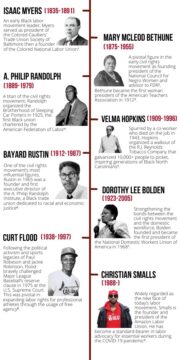Christian Collins in Clasp:
“Turning a blind eye to our history has not saved us from its consequences.” – Cicely Tyson
 Black History Month is a time to reflect on the central role of Black people in shaping this nation. Nowhere is that more evident than the labor movement. A founding tenet of American capitalism and our economy is that Black bodies are worth more than Black minds. This belief is continually demonstrated by the value placed on Black workers and their work. During the COVID-19 pandemic, Black workers risked their lives in essential jobs to keep the country operating. And in doing so faced an increased likelihood of falling victim to COVID-19. Systemic racism and labor market segregation cause Black workers to be disproportionately employed in essential jobs – jobs that don’t provide adequate health care coverage or paid sick leave, exacerbating COVID-19’s risks. Black women in particular have continued to be ignored in the economic recovery from the pandemic, as the dual threats of racism and sexism persist, largely unacknowledged by policymakers.
Black History Month is a time to reflect on the central role of Black people in shaping this nation. Nowhere is that more evident than the labor movement. A founding tenet of American capitalism and our economy is that Black bodies are worth more than Black minds. This belief is continually demonstrated by the value placed on Black workers and their work. During the COVID-19 pandemic, Black workers risked their lives in essential jobs to keep the country operating. And in doing so faced an increased likelihood of falling victim to COVID-19. Systemic racism and labor market segregation cause Black workers to be disproportionately employed in essential jobs – jobs that don’t provide adequate health care coverage or paid sick leave, exacerbating COVID-19’s risks. Black women in particular have continued to be ignored in the economic recovery from the pandemic, as the dual threats of racism and sexism persist, largely unacknowledged by policymakers.
Black History Month’s reflections are only beneficial if we are honest. Modern America’s economic superpower status has long been attributed to the grit and ingenuity of white European settlers building the nation from the ground up, but this narrative is at best a half-truth. Black labor is the cornerstone of U.S. global hegemony. From the slaves who were brought to the shores of Virginia in 1619, through the industrialization of the United States powered by Black workers and families fleeing the South, and by the continued reliance on mass incarceration to produce a cheap workforce for corporations and governments to exploit, the commodification of Black bodies has been the American capitalist formula for economic profit.
More here. (Note: In honor of Black History Month, at least one post will be devoted to its 2025 theme of “African Americans and Labor” throughout the month of February)
Enjoying the content on 3QD? Help keep us going by donating now.
